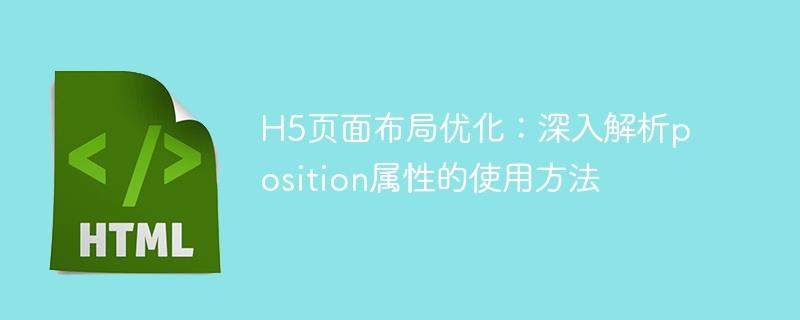
H5页面布局优化:深入解析position属性的使用方法
在H5页面开发中,布局优化是非常重要的一环。其中,position属性是控制元素定位的重要属性之一。本文将深入解析position属性的使用方法,并提供具体的代码示例,以帮助读者更好地理解和应用于实际开发中。
一、position属性的基本概念
position属性用于控制元素的定位方式。它有以下几个取值:
- static:默认值,元素按照HTML文档流进行排列,不受其他定位属性影响。
- relative:相对定位,元素相对于其正常位置进行定位。可以通过top、right、bottom、left属性进行微调。
- absolute:绝对定位,元素相对于其最近的已定位父元素进行定位。如果没有已定位的父元素,则根据html元素进行定位。
- fixed:固定定位,元素相对于浏览器窗口进行定位,不随滚动条的滚动而改变位置。
- sticky:粘性定位,元素在满足指定条件时会固定在屏幕上。常用的条件有top、right、bottom、left属性。
二、position属性的使用方法及代码示例
- 相对定位:relative
相对定位常用于微调元素的位置,不会影响其他元素的布局。代码示例如下:
<style>
.container {
position: relative;
width: 300px;
height: 200px;
}
.box {
position: relative;
top: 20px;
left: 50px;
width: 100px;
height: 100px;
background-color: red;
}
</style>
<div class="container">
<div class="box"></div>
</div>登录后复制
- 绝对定位:absolute
绝对定位常用于实现元素的重叠布局或居中对齐。代码示例如下:
<style>
.container {
position: relative;
width: 300px;
height: 200px;
}
.box1 {
position: absolute;
top: 20px;
left: 50px;
width: 100px;
height: 100px;
background-color: red;
}
.box2 {
position: absolute;
top: 50%;
left: 50%;
transform: translate(-50%, -50%);
width: 200px;
height: 200px;
background-color: blue;
}
</style>
<div class="container">
<div class="box1"></div>
<div class="box2"></div>
</div>登录后复制
- 固定定位:fixed
固定定位常用于实现悬浮导航栏或返回顶部等功能。代码示例如下:
<style>
.container {
height: 2000px;
}
.navbar {
position: fixed;
top: 0;
left: 0;
width: 100%;
height: 50px;
background-color: black;
color: white;
text-align: center;
line-height: 50px;
}
.back-to-top {
position: fixed;
bottom: 20px;
right: 20px;
width: 50px;
height: 50px;
background-color: red;
color: white;
text-align: center;
line-height: 50px;
}
</style>
<div class="container">
<div class="navbar">悬浮导航栏</div>
<div class="back-to-top">返回顶部</div>
</div>登录后复制
- 粘性定位:sticky
粘性定位常用于实现滚动到一定位置时,元素固定在屏幕上。代码示例如下:
<style>
.container {
height: 800px;
overflow-y: scroll;
}
.header {
position: sticky;
top: 0;
width: 100%;
height: 50px;
background-color: black;
color: white;
text-align: center;
line-height: 50px;
}
</style>
<div class="container">
<div class="header">粘性导航栏</div>
<!-- 此处省略其他内容 -->
</div>登录后复制
三、总结
本文详细介绍了position属性的使用方法及代码示例。通过灵活运用不同的position属性取值,可以实现各种复杂的布局效果,从而优化H5页面的展示效果。读者可以根据实际需求,选择合适的定位方式,并结合其他布局技巧,打造出更加出色的网页布局。
